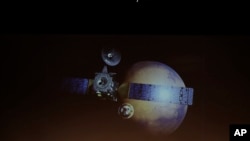A European space probe has swung into position around Mars in preparation to analyze its atmosphere for possible signs of life.
The European Space Agency said Wednesday its Trace Gas Orbiter successfully performed a delicate maneuver known as aerobraking that involved dipping into the red planet's upper atmosphere to slow the probe.
The agency says the orbiter will start looking for trace gases such as methane, which can result from biological or geological activity, in April. It will also search for ice that could help future Mars landings.
A NASA-made radio on board will also help relay signals from U.S. rovers on the surface back to Earth.
Europe plans to land its own rover on Mars in 2021. A European test lander crashed on the surface of Mars in 2016.
European Space Probe Prepares to Sniff Martian Atmosphere

BERLIN, GERMANY —